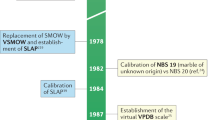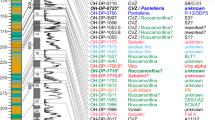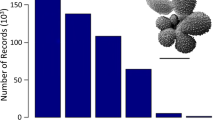Abstract
THE chemical composition of tektites is a major factor to be considered when investigating theories of tektite origin. Many investigators have remarked on the similarity of the composition of tektites to certain types of sedimentary rocks, and this fact has been held to be indicative of a terrestrial origin. Recent determinations1 of the abundances of the alkali elements, lithium, sodium, potassium, rubidium and cæsium in australites showed that a close coherence existed between these five elements in different samples ; in fact, the concentration of one alkali element was shown to be positively correlated with the concentration of any other to a high degree of significance.
This is a preview of subscription content, access via your institution
Access options
Subscribe to this journal
Receive 51 print issues and online access
$199.00 per year
only $3.90 per issue
Buy this article
- Purchase on Springer Link
- Instant access to full article PDF
Prices may be subject to local taxes which are calculated during checkout
Similar content being viewed by others
References
Taylor, S. R., Geochim. et Cosmochim. Acta (in the press).
Urey, H. C., Nature, 179, 556 (1957).
Pettijohn, F. J., “Sedimentary Rocks”, Second ed. (Harper and Bros. N.Y., 1957).
Barnes, V. E., Univ. Texas Publications No. 3945, 477 (1940).
Author information
Authors and Affiliations
Rights and permissions
About this article
Cite this article
CHERRY, R., TAYLOR, S. & SACHS, M. Major Element Relationships in Tektites. Nature 187, 680–681 (1960). https://doi.org/10.1038/187680a0
Issue Date:
DOI: https://doi.org/10.1038/187680a0
This article is cited by
Comments
By submitting a comment you agree to abide by our Terms and Community Guidelines. If you find something abusive or that does not comply with our terms or guidelines please flag it as inappropriate.



